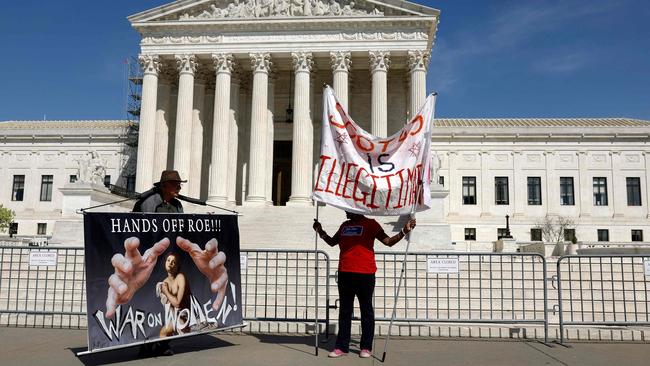US Supreme Court extends hold on abortion pill restrictions
The stay came during an emergency appeal asking the court to block a ruling that would have banned mifepristone.

The US Supreme Court on Wednesday temporarily preserved access to a widely used abortion pill, delaying its decision on lower court rulings placing restrictions on the drug.
Without commenting on the merits of the case, America’s highest court extended an administrative stay freezing the lower court decisions until midnight on Friday (2pm Saturday AEST).
The initial stay came after the Justice Department filed an emergency appeal asking the court to block the lower court rulings that would have banned or limited use of mifepristone, which accounts for more than half of the abortions in the US.
That stay had been scheduled to expire at midnight on Wednesday and the court, in an order signed by judge Samuel Alito, opted to extend the hold on the rulings for two more days. The extension gives the court more time to decide what to do with the case, the most significant on reproductive rights since it tossed out the constitutional right to abortion last year in an opinion penned by Justice Alito, a conservative.
The nine-member bench can rule in any number of ways, and abortion rights and anti-abortion activists – as well as millions of Americans – have been on tenterhooks waiting to see how the conservative-dominated court proceeds.
The case stems from a ruling this month by a US District Court judge in Texas that would have banned mifepristone, which was approved for use by the Food and Drug Administration in 2000.
An appeals court blocked a ban on the pill, but imposed tough restrictions on access, after which the baton was handed to the Supreme Court.
The Supreme Court, where conservatives wield a 6-3 majority, last Friday temporarily stayed the lower court rulings as it weighs what to do next.
The court could decide to freeze the lower court rulings pending an appeal from the Justice Department and the mifepristone manufacturer Danco Laboratories. It could also allow the rulings restricting access to the abortion pill to take effect while the case plays out at the appellate level. The court could also decide to hear arguments in the case itself on an expedited basis.
Complicating the case even further is a ruling by a separate federal court in Washington state that said access to mifepristone should be maintained.
Since the Supreme Court overturned the landmark Roe v Wade ruling that enshrined the constitutional right to abortion, 13 states have banned abortion and it has been severely restricted in others.
Democrat representative Katherine Clark said the court faced a “clear choice.” “Uphold legal and scientific fact or capitulate to MAGA extremism,” Ms Clark said in a reference to former Republican president Donald Trump’s far-right “Make America Great Again” slogan.
“This case marks just the latest assault in the MAGA crusade on reproductive freedom. Republicans have one goal: a nationwide abortion ban.”
Opposition to the legal attack on the abortion pill is being spearheaded by the Justice Department, which argued that the initial federal judge’s ruling was based on a “deeply misguided assessment” of the pill’s safety.
Mifepristone is one component of a two-drug regimen that can be used through the first 10 weeks of pregnancy. It has a long safety record, and the FDA estimates 5.6 million Americans have used it to terminate pregnancies since it was approved.
Polls repeatedly show a clear majority of Americans support continued access to safe abortion, even as conservative groups push to limit or ban the procedure.
AFP



To join the conversation, please log in. Don't have an account? Register
Join the conversation, you are commenting as Logout